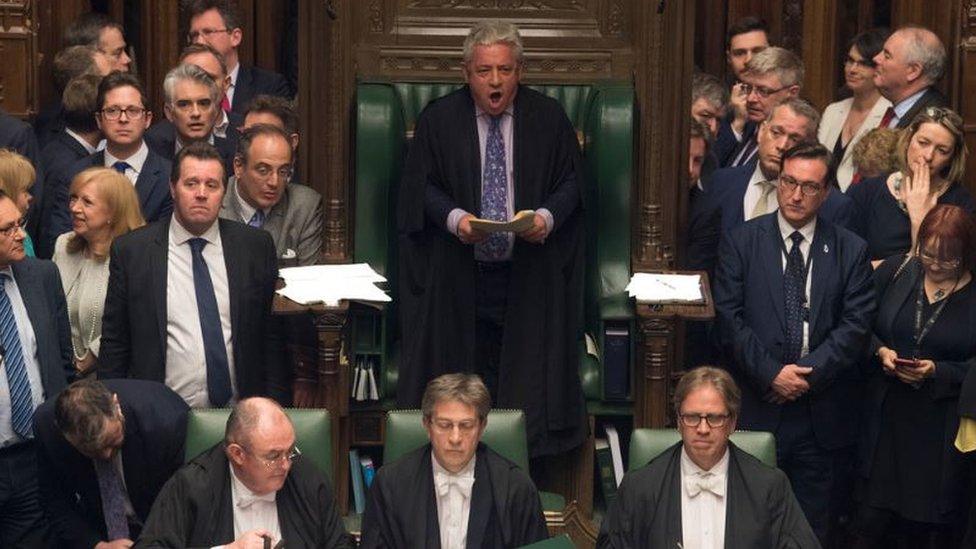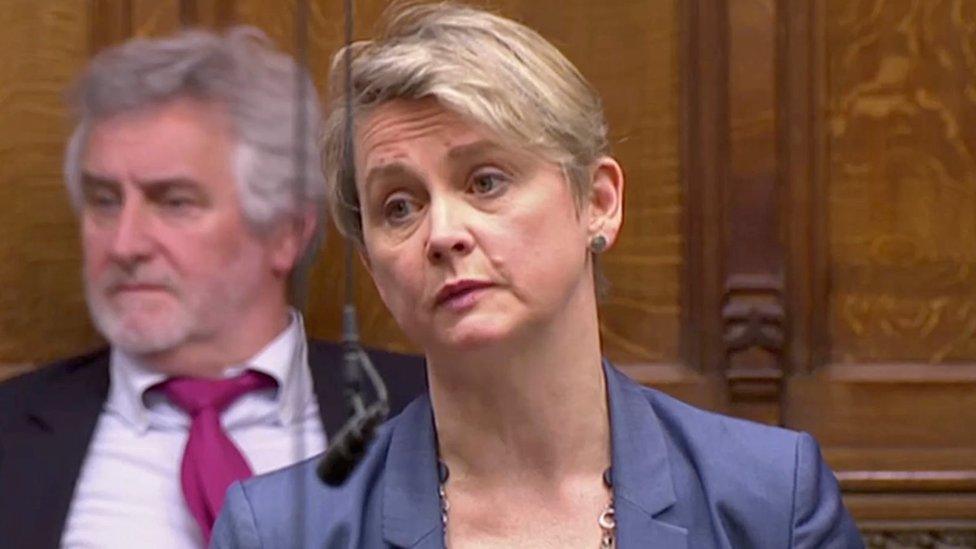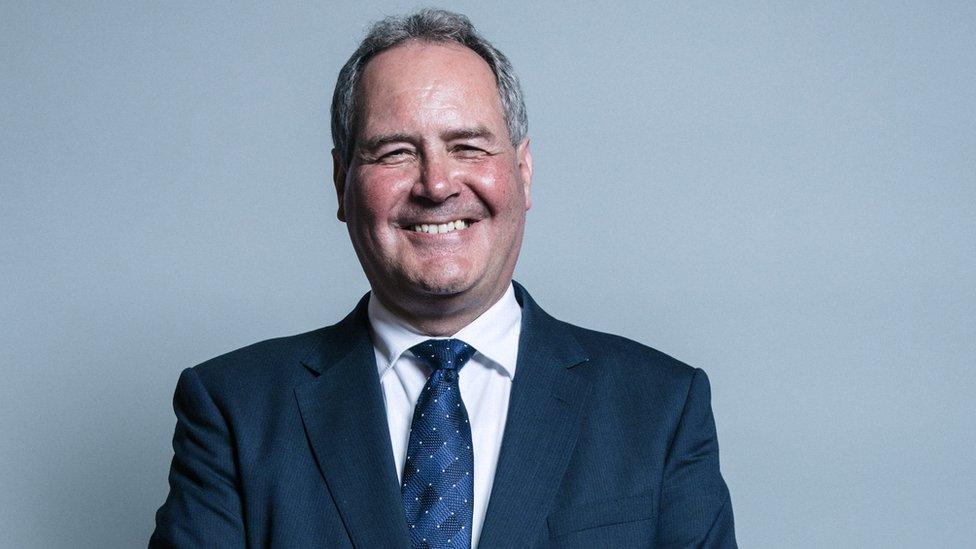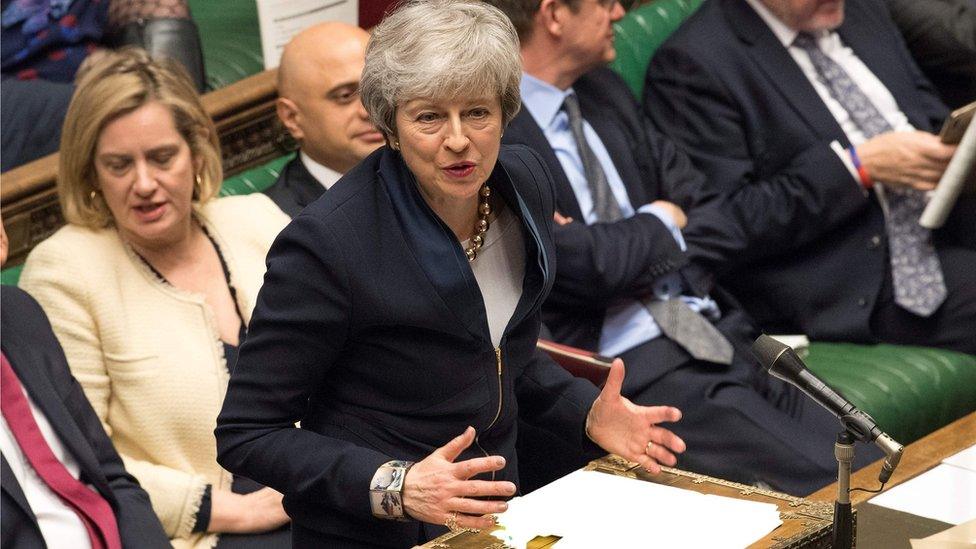Week ahead in Parliament
- Published

Abandon certainty, all ye who enter...
Next week's Parliamentary agenda exists - it's right there on the order papers for the Commons and Lords - but no one believes it provides any reliable guide to how events will unfold.
Brexit developments can be expected to reshape each day's agenda.
Among the likely additions to the schedule are another round of "indicative votes" on alternative Brexit options, a report back from the emergency EU summit on Brexit, and votes on orders to trigger the European Parliamentary elections and to postpone Brexit Day again.
There might even be another attempt by the government to secure a "Meaningful Vote" on the prime minister's withdrawal agreement, perhaps with some added content to win over Labour MPs.
I'm not sure where these would be fitted into the schedule, but the leader of the House has left plenty of room for them, so she won't need a crowbar.
And after a week which has seen nude protests, a tied Commons vote (not to mention a couple of near-ties), the constitutional innovation of MPs legislating to compel the government to change policy, a surreal filibuster in the Lords and then a flood which forced MPs out of the Commons, who is to say what might happen next?
In between times, there are bleak little jokes about ensuring MPs are supplied with copious quantities of used envelopes, so they can scribble new rules of procedure on the back of them as they go along.
I'm told the Commons will be able to convene in their Chamber next week after the flood which struck on Thursday - officials are now confident they won't need to activate their contingency plans for an alternative.
And because this was original scheduled to be a recess week, there's not much action on the Committee Corridor, because the process of organising hearings with panels of witnesses can take quite a while.
So what follows is a brief canter through a rather thin-looking agenda, plus some speculation on the events which may be expected to disrupt it:
Monday 8 April
The Commons opens at 14.30 BST with Housing, Communities and Local Government Questions. As ever, expect a rash of ministerial statements and urgent questions to follow at 15:30, with the strong likelihood of a statement from the prime minister - or at least a UQ on her request to extend Britain's EU membership until the end of June.
MPs are then expected to consider two Brexit-related Statutory Instruments.
Electronic Communications - dealing with the notification of personal data breaches by providers of communications services
Trade in Torture Etc. Goods Regulations - dealing with trade in goods which could be used for capital punishment, torture or cruel, inhuman or degrading treatment or punishment (they include a ban on trade in this equipment and on related technical assistance and a license system for exports of equipment which could be used for torture, but which also has legitimate uses)
Then there will be a General Debate on UN International Day for the Elimination of Racial Discrimination.
But this could be interrupted to allow MPs to consider Lords amendments to the European Union (Withdrawal) (No. 5) Bill - the measure proposed by Yvette Cooper, which would give the Commons some control over any proposed extension of UK membership of the EU.

Yvette Cooper's bill went through the Commons in one day
The day after the Bill achieves Royal Assent, the prime minister will be required to put down a motion on the date of exit, which will be amendable by MPs.
In the Lords at 14:30, a scheduled debate on the residential construction sector has been cancelled in favour of continuing consideration of the Cooper Bill - aka the European Union (Withdrawal) (No. 5) Bill.
Having disposed of the Second Reading on Thursday - after a long filibuster around the Business of the House Motion allowing the Bill to be considered - it has been agreed that peers will complete the Committee stage, Report stage and Third Reading by "around 20:00", allowing it to be sent back to the Commons so MPs can consider any amendments that have been made.
Tuesday 9 April
First up in the Commons at 11.30 is Treasury Questions - which may see some open Brexiteer attacks on the Chancellor, Philip Hammond.
The day's Ten Minute Rule Bill, from Conservative MP Bob Blackman - who chairs the All-Party Parliamentary Group on Smoking and Health - is the Tobacco Companies (Transparency) Bill, which will require the companies to disclose profits, taxes paid, and brand-specific sales and marketing data.
This would include data broken down to local authority level, by product type.
Mr Blackman says this information is already compiled and some of it is provided to HMRC, so his Bill would simply make existing information available to the public.

Tory MP Bob Blackman chairs the All-Party Parliamentary Group on Smoking and Health
MPs then vote on a series of Brexit SIs maintaining international sanctions against a series of countries - Burma, Venezuela, Iran and Guinea-Bissau to approve the (Sanctions) (EU Exit) Regulations 2019.
And that is followed by a general debate on Housing.
In Westminster Hall, Scottish Conservative John Lamont will lead a debate on the devolution of welfare at 9.30.
The Scotland Act 2016 devolved 11 DWP benefits totalling about £3bn to the Scottish Parliament.
Mr Lamont will focus on the Scottish Government plans to replace PIP, DLA, attendance allowance and carers allowance, which will not now be completed until 2024.
Other subjects for debate include regulation of the incineration of waste (at 11:00) and NHS funding for age-related macular degeneration (at 16:00).
On the Committee Corridor at 10:45, the special Joint Committee examining the Draft Domestic Abuse Bill will hear from a series of witnesses, including Councillor Simon Blackburn, chair of the Local Government Association's Safer, Stronger Communities Board, Hestia Housing and Support, and Donna Covey, the chief executive of AVA (Against Violence and Abuse).
In the Lords at 14:30, peers will consider a series of Brexit related SIs.
Wednesday 10 April
MPs begin with 30 minutes of Northern Ireland questions at 11:30, followed by Prime Minister's Question Time at 12:00.
It may be that the PM is absent at the special EU summit on Brexit, in which case her stand in will be the de-facto deputy prime minister, David Lidington.
The day's Ten Minute Rule Bill, from Labour frontbencher Louise Haigh, is the Parental Rights (Rapists) and Family Courts Bill, designed to remove parental rights from men who father children through rape.
The main debate is on the 50th Anniversary of the Continuous at Sea Deterrent - the UK's submarine-launched nuclear missiles.
Expect a key theme to be the issue of replacing the existing Trident submarines.
In Westminster Hall debates include:
09:30: Pension transfers and the British Steel pension scheme
14:30 Legal aid for inquests
16:30 LGBT rights in Brunei
On the Committee Corridor at 14:45, the Procedure Committee will ponders whether there should be a Commons Budget Committee, designed to provide better scrutiny of the overall way the government spends taxpayers' money.
In the Lords at 15:00, peers will consider Commons amendments to the Offensive Weapons Bill and vote on a series of devolution-related statutory instruments.
Thursday 11 April
The Commons opens at 09:30 with Digital, Culture, Media and Sport Questions, followed by questions to the Attorney General Geoffrey Cox - now an important player in Brexit issues.
That will be followed by the weekly Business Statement from the Leader of the House, Andrea Leadsom.
If MPs are to sit on Friday to deal with urgent Brexit business, this is when the announcement may come.
Also possible is a report back from the prime minister on that EU summit, and talks about the postponement of Brexit Day.

Theresa May could report back to the Commons on Wednesday's emergency EU summit
The main scheduled business is a Backbench Debate on the definition of Islamophobia.
In Westminster Hall at 13:30, Labour ex-minister David Hanson will lead a debate on preventing retail crime.
In the Lords (11:00) there is another battery of SIs for peers to consider and they also debate the Draft National Policy Statement for Water Resources Infrastructure
And the agenda also contains an ominous little line: "If necessary, the consideration of secondary legislation relating to exiting the EU".
Friday 12 April
This is the current default date for Britain to leave the EU.
At the moment, neither House is scheduled to sit.
But Mrs Leadsom has warned that could change if there's a need to pass emergency legislation.